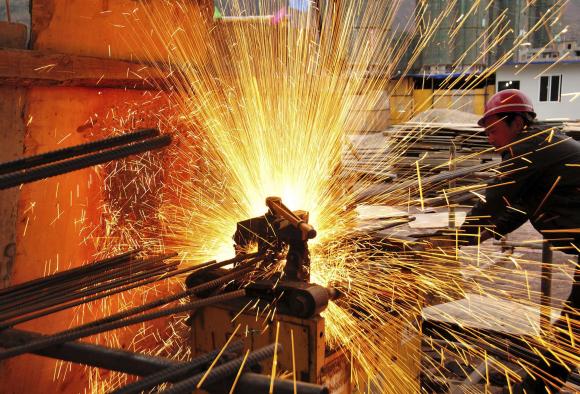 |
|
A worker welds at a construction site in Yiliang, Yunnan province, February 28, 2015.[Photo/Agencies] |
Since Gordan Chang's 2001 theory about the 'coming collapse' of the Chinese economy, from time to time, others have tried to follow in his footsteps to make similar predictions. At the recent World Economic Forum in Davos, we heard the latest iteration and version of the meltdown story, with some 'doom prophets' contending that China's economy is headed towards some form of a crisis or a hard landing. The problem with these dire prophecies about China is that they have dire empirical record—they have been proven wrong, consistently.
The interesting question is: what informs these cataclysmic assessments? It could be that such predictions generate more attention and hype, even if wrong. It has also been suggested that some of these doom prophets have a vested interest in creating a bearish perception of the Chinese economy so as to profit from short-selling activities.
A closer look at recent adverse economic forecasts, however, suggests a more fundamental problem in analysis: flawed assumptions.
First, a large part of the current negativity towards China's economy is related to the perceived volatility and vulnerability of its financial markets. Yet the financial markets have never been a reliable indicator of the true strength of the economy. The Nobel Prize economist Joseph Stiglitz notes, "there's always a gap between what's happening in the real economy and financial markets." This gap is even more important in China's case since its financial markets are less mature as compared to those in more developed economies. Hence, to simply assume what is happening in the Chinese markets reflects the country's economic state is facile.
Second, slowing growth figures in China have been cited as a worrying trend which potentially portends the end of the Chinese success story. Again here, incorrect assumptions are being made. China's lower GDP growth in recent years should be kept in perspective. Its 6.9 percent growth rate last year is still markedly ahead of other major economies such as the US (2.4 percent), Europe (0.8 percent) and Japan (0.4 percent). Moreover, it is often overlooked that China is now a $10 trillion economy, which means that a growth of one percent today is 'equivalent to 1.5 percentage points five years ago and two percentage points 10 years ago.' In aggregate terms therefore, China's present economic growth is not substantively weaker than before. The so-called new economic normal is actually not normal for an economy the size of China's; it is better than usual.
Third, some forecasts do not take into adequate account the fact that the Chinese economy is undergoing structural reforms, from shifting to an export-oriented and State-driven economy to a more consumption-based and market-driven economy. Given the unprecedented and testing nature of this adjustment, inevitably, there will be some challenges along the way. These hiccups should not be made to sound more serious than they actually are. A longer-term perspective is needed. Even if these challenges grow to become more problematic, China is in a fairly strong position to tackle them with a war-chest of more than $3 trillion in reserves.
A number of issues still continue to hamper the Chinese economy, such as a flagging property sector, industrial overcapacity and rising local government debt while global growth remains weak. But there will not be an end to the Chinese success story. It is more accurate to describe the Chinese success story as going through an upgrade—towards a more sustainable, balanced and better version 2.0.
Hoo Tiang Boon, a coordinator, MSc. (Asian Studies) programme, and Assistant Professor with S. Rajaratnam School of International Studies of Nanyang Technological University in Singapore.
The opinions expressed here are those of the writer and don't represent views of China Daily website.